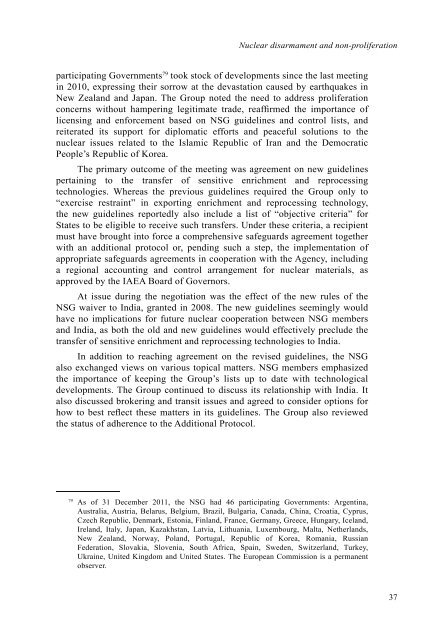DYB2011-Part-II-web
DYB2011-Part-II-web
DYB2011-Part-II-web
You also want an ePaper? Increase the reach of your titles
YUMPU automatically turns print PDFs into web optimized ePapers that Google loves.
Nuclear disarmament and non-proliferation<br />
participating Governments79 took stock of developments since the last meeting<br />
in 2010, expressing their sorrow at the devastation caused by earthquakes in<br />
New Zealand and Japan. The Group noted the need to address proliferation<br />
concerns without hampering legitimate trade, reaffirmed the importance of<br />
licensing and enforcement based on NSG guidelines and control lists, and<br />
reiterated its support for diplomatic efforts and peaceful solutions to the<br />
nuclear issues related to the Islamic Republic of Iran and the Democratic<br />
People’s Republic of Korea.<br />
The primary outcome of the meeting was agreement on new guidelines<br />
pertaining to the transfer of sensitive enrichment and reprocessing<br />
technologies. Whereas the previous guidelines required the Group only to<br />
“exercise restraint” in exporting enrichment and reprocessing technology,<br />
the new guidelines reportedly also include a list of “objective criteria” for<br />
States to be eligible to receive such transfers. Under these criteria, a recipient<br />
must have brought into force a comprehensive safeguards agreement together<br />
with an additional protocol or, pending such a step, the implementation of<br />
appropriate safeguards agreements in cooperation with the Agency, including<br />
a regional accounting and control arrangement for nuclear materials, as<br />
approved by the IAEA Board of Governors.<br />
At issue during the negotiation was the effect of the new rules of the<br />
NSG waiver to India, granted in 2008. The new guidelines seemingly would<br />
have no implications for future nuclear cooperation between NSG members<br />
and India, as both the old and new guidelines would effectively preclude the<br />
transfer of sensitive enrichment and reprocessing technologies to India.<br />
In addition to reaching agreement on the revised guidelines, the NSG<br />
also exchanged views on various topical matters. NSG members emphasized<br />
the importance of keeping the Group’s lists up to date with technological<br />
developments. The Group continued to discuss its relationship with India. It<br />
also discussed brokering and transit issues and agreed to consider options for<br />
how to best reflect these matters in its guidelines. The Group also reviewed<br />
the status of adherence to the Additional Protocol.<br />
79 As of 31 December 2011, the NSG had 46 participating Governments: Argentina,<br />
Australia, Austria, Belarus, Belgium, Brazil, Bulgaria, Canada, China, Croatia, Cyprus,<br />
Czech Republic, Denmark, Estonia, Finland, France, Germany, Greece, Hungary, Iceland,<br />
Ireland, Italy, Japan, Kazakhstan, Latvia, Lithuania, Luxembourg, Malta, Netherlands,<br />
New Zealand, Norway, Poland, Portugal, Republic of Korea, Romania, Russian<br />
Federation, Slovakia, Slovenia, South Africa, Spain, Sweden, Switzerland, Turkey,<br />
Ukraine, United Kingdom and United States. The European Commission is a permanent<br />
observer.<br />
37


